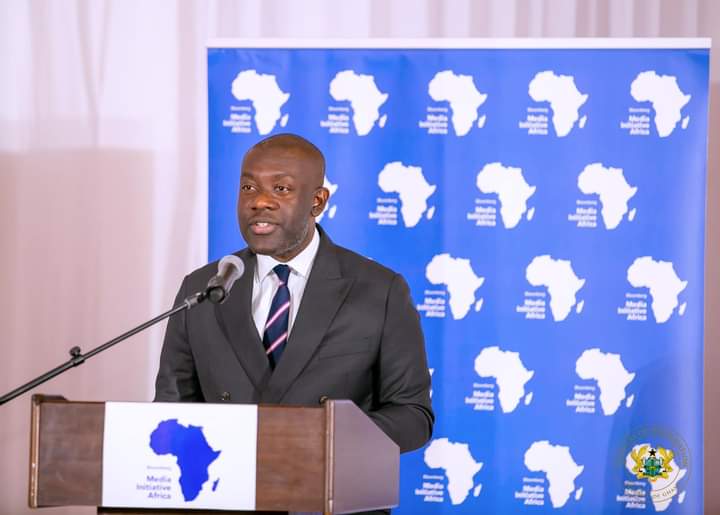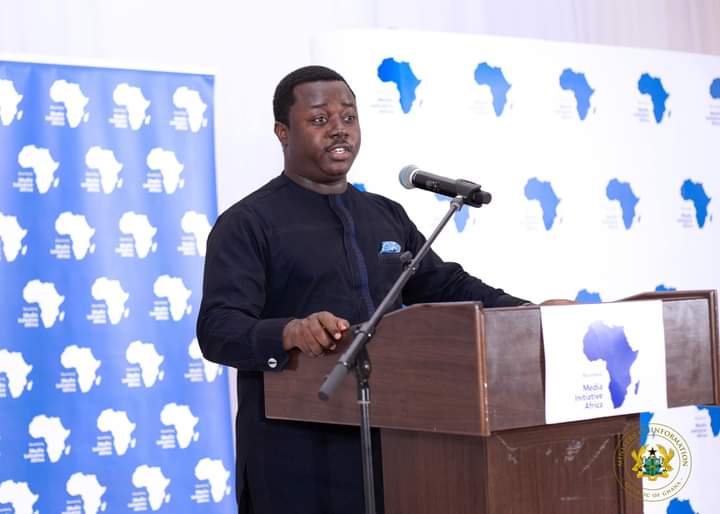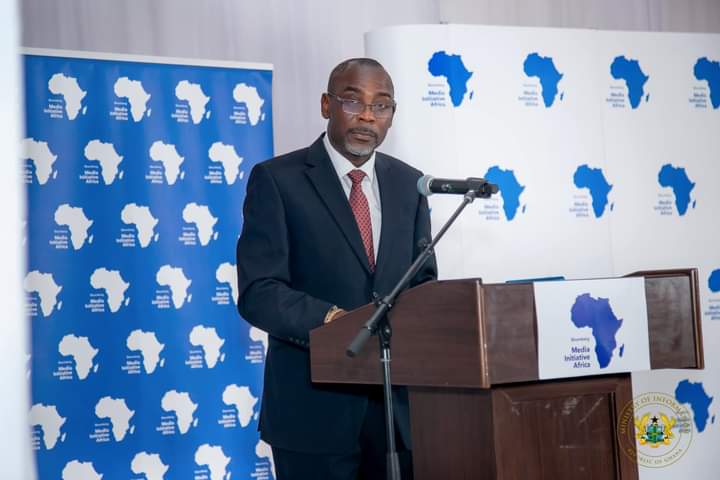Use The Skills Acquired To Change The Narrative – Oppong Nkrumah To Journalists Trained In Financial Journalism
It was all joy and happiness when some 88 journalists selected from the various media outlets in Ghana and beyond graduated on Thursday, November 10, after rigorous training in Financial Journalism.
The graduates comprise 30 females and 58 males. Out of the total number, 77 of them are practicing journalists.
The six-month training was organized by the Bloomberg Media Initiative Africa (BMIA), with support from Strathmore Business School, the University of Ghana Business School, and others sometime in 2019 and 2020.
Giving the keynote address, Information Minister Kojo Oppong Nkrumah urged the graduates to apply the knowledge acquired in the discharge of their duties to help change the narrative.
“For you the graduating class, we will be disappointed if your personal work and indeed the composite output from the industry does not show any signs of improvement after this significant investment in you,” he said.

“Trainings such as this targeted at journalists are essential to ensure that the media industry and journalism deliver on their true purpose to our democracy.
“What is the true purpose of the media industry and journalism to our democracy. I submit to you that is to serve all stakeholders with equal access to the public space to participate in discourse that promotes our best values, our best aspirations and a thought-led good society,” he said.
The sector Minister also called on stakeholders within the media space to collaborate and help build the capacity of Ghanaian journalists in business and financial reporting.
He believes training of journalists in business and financial reporting is essential in equipping them with the needed skills and know-how to ensure accuracy in reporting financial issues.
“As I have mentioned in times past, the media and journalism frontier require collaborations for impact. That is why we appreciate partnerships such as this one between Bloomberg, Strathmore Business School, the University of Ghana Business School and Ghana Institute of Journalism (GIJ) to train more economic and financial journalists and welcome more of such partnerships,” he added.
On his part, the deputy Education Minister Rev. John Ntim Fordjour stressed on the need to use the knowledge acquired to promote unity in such difficult economic times.

“It is important that we recognize that even in the current turbulent time in the world, we can still rely on the strength and power of members of the Fourth Estate to hold the world together.
“All of us here are very confident to hop on the plane, to leave here to Cape Town or even London and even when the plane is turbulent we trust that not only is the pilot licensed to land to safety and the capacity of the pilot is continuously enhanced for him to ensure safety.
“Even more critical and crucial is the skill of journalists to navigate us as a country, continent, or global community in the face of turbulence because the level of professionalism of journalists is a very important role. If the right voice is not trumpeted, the wrong voice will be heard,” he said.
He lauded all stakeholders for such an impactful programme, which will go a long way to ensure the skills of journalists are enhanced.
Adding his voice, the Rector of the Ghana Institute of Journalism (GIJ) Professor Kwamena Kwansah-Aidoo, urged journalists to report accurately in the wake of the global economic hardship, as this was critical to reducing fear and panic created by the widespread fake news.

“With your words and all the things you have learned here…You have conquered the language of business and finance so go out there and be responsible storytellers.”
Also, present at the event was the Provost of the College of Humanities, University of Ghana, Prof. Daniel Frimpong Ofori; Dean of the University of Ghana Business School, Prof. Justice Bawole; Dean of the Strathmore Business School, Dr. George Njenga, Senior Lecturer at the Ghana Institute of Journalism, Dr. Timothy Quashigah and other representatives from partnering institutions.
Background of the program
Launched by Mike Bloomberg in South Africa in 2014, the Bloomberg Media Initiative Africa (BMIA) is a pan-Africa program designed to accelerate the development of a globally competitive media and financial reporting sector to promote transparency and accountability in Africa to enhance the quality of financial coverage and the availability of reliable and timely data on the continent, and support initiatives contributing to the vitality of community media.
Funded by Bloomberg Philanthropies, with support from Ford Foundation and the Stavros Niarchos Foundation, the Financial Journalism Training (FJT) is the BMIA’s signature program developed to increase the pipeline of skilled financial journalists and analysts embracing a data-driven journalism culture across Africa.
The FJT Program provides journalists with training to enhance their financial and business reporting skills and knowledge. The program is delivered by leading faculty from distinguished business and journalism schools in participating African countries.
Phase 1 of the BMIA FJT was successfully implemented in Kenya, Nigeria, and South Africa between 2015 and 2017.
By the end of 2017, more than 500 journalists and mid-career professionals had completed the 6-month certificate program. The success of Phase 1 prompted the BMIA team to expand the training program to five more African countries: Ghana, Zambia, Tanzania, Cote d’Ivoire, and Senegal.
Phase 2 of the Financial Journalism Training program was launched in Ghana and Zambia in January 2019, and in Tanzania, the program was launched in September 2019. The two intakes in Ghana, Zambia, and Tanzania have 255 delegates graduating in November 2022.


